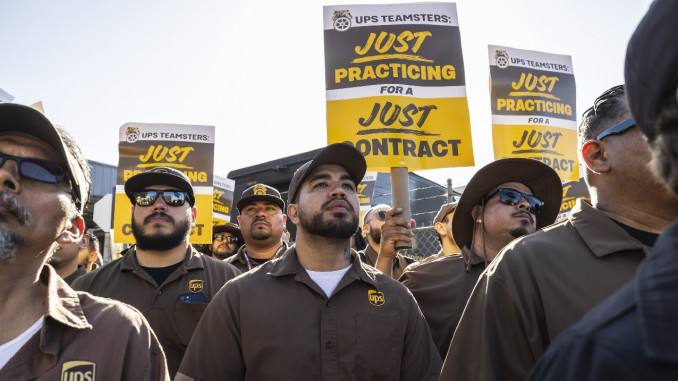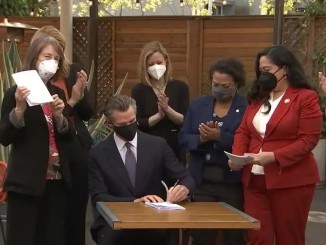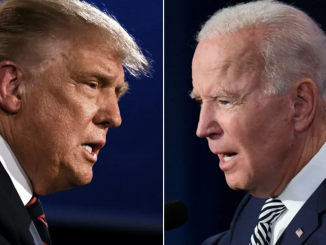
Leaders of the International Brotherhood of Teamsters (IBT) announced toward the end of last month that UPS workers had ratified a new five-year contract. The new contract included wage increases of up to 16% for most drivers working full-time, topping out at $47/hr. The new contract eliminates the hated two-tier system for delivery drivers that meant top pay for those hired after 2018 was $6/hr less than top pay for delivery drivers hired before 2018. Now, all full-time delivery drivers will have the same wage scale regardless of their hiring date. UPS promises the cabs of about one third of UPS trucks will be air-conditioned over the next few years. The company also accepted some limits on forced overtime.
UPS Teamster members have the right to accept or reject a tentative contract proposed by the union leaders. Some 130,000 or 87% of those UPS workers voting approved the proposed new contract. The turnout for the contract ratification vote was significantly larger than in the past, with 57% of those eligible to vote returning ballots. There is no doubt that the new contract is better than the one which expired. Union leaders say this was a victory, with no concessions. But was it a historic victory as the union leaders claim? A close look at this contract suggests that the problems are at least as many as the gains workers made.
The wage increases for both full-timers and part-timers barely make up for inflation, which has cut the buying power of UPS paychecks by 18% over the last five years. The old contract included provisions for very small Cost of Living (COLA) raises to offset inflation, but the way it was calculated meant that the company payments were always very small. UPS workers need a much stronger COLA clause given how sharply inflation is cutting into the buying power of everybody’s wages, but the union agreed to keep the old, inadequate formula.
A majority of UPS workers work part-time. Part-timers work on loading docks, moving incoming packages onto conveyor belts, sorting them, and loading them for delivery. They work in shifts throughout the evening hours and in the early morning. The work is exceedingly fast-paced, enforced by a small army of supervisors. Before the new contract some part-timers were making $21/HR; most were paid less than that. Top pay for full-timers in the old contract was $42/hour; so on an hourly basis, part-timers were making about half of what full-timers earned per hour. The IBT promised to win big wage increases for part-timers and to make UPS combine part-time jobs into full-time jobs, saying it was time “to end part-time poverty.” However, the wage increases in the new contract for part-timers do little to close the gap between the wage scale for full-timers and part-timers. Top pay for part-timers at the end of the new contract will be $25.75/hour or just a little more than 50% of the full-time workers’ hourly rate. The number of full-time jobs the company commits to create for part-timers is less than they have agreed to create in the past. Loopholes in the contract make it easy for the company to break this commitment. Under the terms of the new Teamster contract, many UPS workers will continue to live in “ part-time poverty” for the next five years.
Adding insult to injury, the union agreed to allow UPS to pay newly hired part-time workers less than part-time workers already on the payroll. The difference in pay, at the end of the contract, will be almost $2/hr less. So much for the union’s claim it made no concessions to the company, and if two tiers of pay for workers doing the same work is bad for full-timers, why is it okay for part-timers? Some part-timers, angry that the new contract offered them so little, tried to organize a “no vote,” but their effort started too late to get much traction.
Perhaps the biggest issue the union hardly addressed are the horrific working conditions at UPS for both full-timers and part-time workers. Ventilation is terrible in UPS warehouses. The cargo areas in the back of UPS delivery vehicles heat up like ovens in the summer. Both drivers and warehouse workers spend a lot of time working in these areas. Air conditioning just for truck cabs won’t address these dangers.
The brutal pace of work UPS demands is something the IBT’s leaders refused to confront in this contract, as in the past. Teamster contracts with UPS have no clauses that limit the workload the company can pile on both full-time and part-time workers. Overtime is compulsory.
Why did the union leaders recommend a contract that does little for the majority of UPS workers who work part-time? Fifty years ago, UPS paid warehouse workers about the same per hour as drivers and those jobs were full-time. Then, the IBT allowed UPS to start replacing full-time loading dock and warehouse workers with part-timers who were paid a lot less. Low pay and horrible working conditions led to high rates of turnover in the part-time workforce. High turnover was the union officials’ excuse for not bothering with the concerns of part-timers. As a consequence, part-timers often don’t join the union in so-called right-to-work states where union membership is optional. Many part-timers who are in the union complained that they never got a ballot. The reason given is that the company didn’t furnish the union with up-to-date address information. The election statistics show that, for one reason or another, about 30,000 UPS workers represented by the Teamsters never got a chance to vote on the contract. Most of them were part-timers.
Part-time jobs with low pay are increasing as a percentage of the jobs available in our society. Many UPS part-timers work one or sometimes two more part-time jobs to make ends meet, as do part-time workers in other parts of the economy, especially young workers. Having to work two or three part-time jobs makes our lives crazy. Bosses have found it very profitable to run businesses with a majority of the workers on part-time, with frequently changing schedules. Part-time work, with low hourly pay and few or no benefits is becoming more and more widespread throughout the whole economy. UPS pioneered substituting part-time jobs for full jobs. The IBT missed a historic opportunity to start reversing this trend.
Carol Tome, UPS’s top boss, called the contract a “win-win.” When your boss and your union officials declare that the contract they’ve negotiated is a win for both sides then you can be sure that the workers lost out somewhere. Just ask a UPS part-timer.




